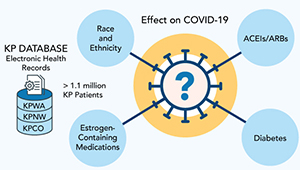Susan Shortreed, PhD
Biography
Susan Shortreed, PhD, uses statistics and machine learning methods to address health science problems, with a special emphasis on analyzing complex longitudinal data. She develops and evaluates statistical approaches for observational data, and works to improve the design and analyses of studies that use data collected from electronic health care records. She is leading a project to develop statistical methods for constructing personalized treatment strategies using data captured from electronic health records.
Dr. Shortreed earned her PhD in statistics from the University of Washington. Then she spent two years in the Department of Epidemiology and Preventive Medicine at Monash University in Melbourne, Australia, and two years in the School of Computer Science at McGill University in Montreal, Canada. Dr. Shortreed has collaborated with scientists in a broad range of areas including alcohol use, cancer screening, and medication safety. She now works alongside researchers in mental and behavioral health, evaluating and comparing treatments for chronic pain and depression, and interventions to prevent suicide. Dr. Shortreed is an investigator with the Mental Health Research Network, designing studies to address important public health concerns, such as determining which antidepressant medications work best for which patients and developing risk prediction algorithms to identify individuals who may be at increased risk for suicidal behavior.
Dr. Shortreed is also an affiliate professor of biostatistics at the University of Washington School of Public Health. She served on the executive board for the American Statistical Association’s Section on Statistics in Epidemiology and the editorial board of the Journal of the Royal Statistical Society, Series C: Applied Statistics.
Research interests and experience
-
Biostatistics
Design and analysis of studies that use data collected from electronic health records; analysis of complex longitudinal data; methods for constructing personalized treatment strategies, computational statistics and algorithms; machine learning; variable selection methods.
Medication Use & Patient Safety
Biostatistics; machine learning; using data collected from electronic health records to study rare adverse events; opioid safety; medication safety in pregnancy.
-
Mental Health
Biostatistics; treatment for chronic depression; suicide prevention; developing personalized treatment strategies; developing risk prediction models.
Recent publications
Turner JA, Shortreed SM, Saunders KW, LeResche L, Von Korff M. Association of levels of opioid use with pain and activity interference among patients initiating chronic opioid therapy: a longitudinal study. Pain. 2016 Apr;157(4):849-57. doi: 10.1097/j.pain.0000000000000452. PubMed
Simon GE, Coleman KC, Rossom R, Beck A, Oliver M, Johnson E, Whiteside U, Operskalski B, Penfold RB, Shortreed SM, Rutter C. Risk of suicide attempt and suicide death following completion of the patient health questionnaire depression module in community practice. J Clin Psychiatry. 2016 Feb;77(2):221-7. doi: 10.4088/JCP.15m09776. PubMed
Shortreed SM, Von Korff M, Thielke S, LeResche LA, Saunders KW, Rosenberg D, Turner JA. Assessing nonresponse bias with electronic health records: a survey of chronic opioid therapy patients. Obs Stud, 2:24-38. PubMed
Ertefaie A, Shortreed S, Chakraborty B. Q-learning residual analysis: application to the effectiveness of sequences of antipsychotic medications for patients with schizophrenia. Stat Med. 2016 Jan 10. doi: 10.1002/sim.6859. [Epub ahead of print]. PubMed
Moodie EE, Karran JC, Shortreed SM. A case study of SMART attributes: a qualitative assessment of generalizability, retention rate, and trial quality. Trials. 2016 May 14;17(1):242. doi: 10.1186/s13063-016-1368-3. PubMed
Simon GE, Beck A, Rossom R, Richards J, Kirlin B, King D, Shulman L, Ludman EJ, Penfold R, Shortreed SM, Whiteside U. Population-based outreach versus care as usual to prevent suicide attempt: study protocol for a randomized controlled trial. Trials. 2016 Sep 15;17(1):452. doi: 10.1186/s13063-016-1566-z. PubMed
Shortreed SM, Von Korff M, Thielke S, LeResche L, Saunders K, Rosenberg D, Turner JA Electronic Health Records to Evaluate and Account for Non-response Bias: A Survey of Patients Using Chronic Opioid Therapy 2016 Jan;2:24-38. Epub 2016-02-01. PubMed
Shortreed SM, Laber E, Pineau J, Murphy SA. Imputing missing data from sequential multiple assignment randomized trials. In: Moodie EEM, Kosorok MR, editors. Adaptive Treatment Strategies in Practice: Planning Trials and Analyzing Data for Personalized Medicine. Philadelphia: SIAM; 2015. p.178-230. PubMed
Von Korff M, Turner JA, Shortreed SM, Saunders KW, Rosenberg D, Thielke S, LeResche LA. Timeliness of care planning upon initiation of chronic opioid therapy for chronic pain. Pain Med. 2016 Mar;17(3):511-520. Epub 2015 Dec 14. PubMed
Simon GE, Rossom RC, Beck A, Waitzfelder BE, Coleman KJ, Stewart C, Operskalski B, Penfold RB, Shortreed SM. Antidepressants are not overprescribed for mild depression. J Clin Psychiatry. 2015 Dec;76(12):1627-32. doi: 10.4088/JCP.14m09162. PubMed
Research

COVID risks not meaningfully greater with estrogen-containing medications
Oral contraceptives, hormone therapy not linked to more severe COVID outcomes.
Research

A medication that can relieve symptoms of psychosis is underused
Study finds that many patients who might benefit from clozapine don’t receive it.
Research

New findings on treating hypertension in pregnancy
A study led by Dr. Sascha Dublin finds similar outcomes for 3 hypertension medications, filling an evidence gap.
COVID-19

Greater infection risks linked to COVID-19 disparities
New work by Susan Shortreed, PhD, finds infection risks drive worse outcomes for some racial and ethnic groups.
Drugs, diabetes, disparities

Studying COVID-19 risk and outcomes
Dr. Sascha Dublin tells how studies of KP electronic health record data can improve COVID-19 treatment and prevention.
KPWHRI IN THE MEDIA
Simpler models for predicting suicide risk work comparably to more complex ones
Q&A: Simple machine learning model predicts suicide risk well
Healio Psychiatry, April 12, 2023



